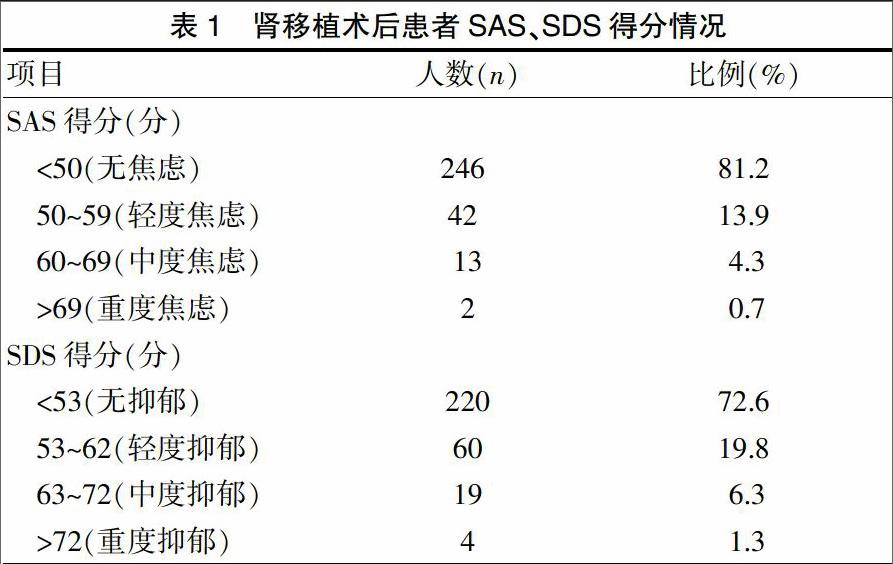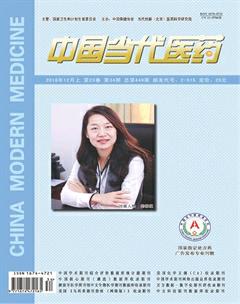肾移植患者心理整合情况的临床调查
周琴飞+张亚林



[摘要]目的 通過调查肾移植术后患者焦虑、抑郁等心理状态及心理整合情况,分析肾移植术后患者的心理体验。方法 纳入2012年5~9月在中南大学三所附属医院就诊的303例肾移植术后患者,采用定式问卷,包括基本情况表、焦虑自评量表(SAS)、抑郁自评量表(SDS)和心理整合情况表,调查肾移植患者的心理整合情况现状及与心理状态的相关性。结果 肾移植患者的SAS得分为(40.99±10.08)分,SDS得分为(44.84±11.93)分,均高于常模[(37.23±12.59)、(41.88±10.57)分](P=0.000);绝大部分(84.2%)肾移植患者认为移植的肾脏已成为自己身体的一部分,而仍有患者不确定(11.5%),甚至有些患者(21.8%)认为移植的肾脏是体内异物。将心理整合情况进行因子分析,提取出两个因子——器官整合及与供者关系。相关性分析显示,器官整合、与供者关系均与SAS、SDS得分显著相关(P<0.05)。结论 大多数肾移植患者的心理整合情况良好,但仍有一部分患者心理整合过程持续存在异常,临床上应早期鉴别心理整合出现问题的患者,及时介入干预,以改善患者的心理状态,提高其生存质量。
[关键词]肾移植;心理整合;焦虑;抑郁
[中图分类号] R318.16 [文献标识码] A [文章编号] 1674-4721(2016)12(a)-0007-04
Clinical investigation of psychological integration in patients with kidney transplantation
ZHOU Qin-fei1 ZHANG Ya-lin2
1.Department of General Medicine,Zhejiang Cancer Hospital,Hangzhou 310022,China;2.Department of Mental Health,the Second Hospital of Xiangya in Central South University of Hunan Province,Changsha 410011,China
[Abstract]Objective To investigate the anxiety and depression of psychological state and so on and psychological integration status of patients after kidney transplantation,and analyze the psychological experience of patients after kidney transplantation.Methods 303 cases after kidney transplantation treated by three affiliated hospitals of Central South University from May to September 2012 were included.Formulary questionnaire including basic information table,self-rating anxiety scale (SAS),self-rating depression scale (SDS) and psychological integration scale were used to investigate the psychological integration of patients after kidney transplantation and the correlation between psychological integration and psychological state.Results SAS score of patients with kidney transplantation was (40.99±10.08) points,SDS score was (44.84±11.93) points,and SAS and SDS score were higher than those of the norm [(37.23±12.59) points,(41.88±10.57) points] (P=0.000).The vast majority (84.2%) of patients with kidney transplant believed that the transplanted kidney had become a part of the body,but still a small part of the patients (11.5%) were not sure even some patients (21.8%) thought that the kidney transplanted were still a foreign body.Factor analysis of psychological integration was conducted and two factors extracted—organ integration and the relationship with donor.Correlation analysis showed that organ integration and the relationship with donor were significantly correlated with SAS and SDS score (P<0.05).Conclusion Most of patients with kidney transplant have good psychological integration,but there is still a part of patients with persistent abnormal psychological integration process,early identification of psychological integration problems of patients and timely intervention can improve the psychological status and quality of life of patients with kidney transplantation.
[Key words]Kidney transplantation;Psychological integration;Anxiety;Depression
终末期肾病指各种慢性肾脏疾病的终末阶段,而肾移植已经成为终末期肾病治疗的最佳选择。国外众多研究发现移植患者对自身疾病及移植器官的感知可能影响患者的躯体康复[1-3],因此,对于肾移植患者而言,除了术后生理功能的恢复外,对新器官的认知及心理体验也同样重要[2,4]。
心理整合概念早在1971年由Muslin[5]提出,定义为移植的器官被机体接纳、同化成为自身一部分的过程,同时提出了渐进性内化假说:初始阶段为异体阶段,患者将移植器官认为是陌生的“异物”,出现“自我”排斥;第二阶段为部分一体化阶段,患者对新器官的关注度降低,移植器官为过渡对象,此时既是“异物”,也是“自我的一部分”;最后为完全一体化阶段,移植器官变成“自我的一部分”,不再有意地被患者所感知。心理整合被认为是长期的渐进过程,由于个体存在差异,这一过程有可能出现各种问题,比如后期会重新产生“异物”感或强烈的敌视心理等[6]。
目前,在国内器官移植领域,精神心理相关的研究相对较少,而有关心理整合的研究更是有限,人们对这一过程尚缺乏深入的了解和认识。本研究意在调查肾移植患者的心理整合情况以及相关的心理状态,探讨我国文化背景下肾移植患者的心理体验,以寻找可能的临床干预切入点。
1资料与方法
1.1一般资料
本研究共纳入303例肾移植术后患者,均为2012年5~9月在中南大学三所附属医院住院治疗或门诊复查的患者。男性218例,女性85例,年龄16~66岁,平均(38.12±10.43)岁。所有患者意识清楚,阅读和理解能力满足研究条件,排除重性精神病及认知功能障碍患者。
1.2研究方法
对符合标准的肾移植术后患者,采用定式问卷,统一的指导语,以保证数据的客观性和准确性,问卷包括基本情况表、焦虑自评量表(SAS)及抑郁自评量表(SDS)、心理整合情况表。心理整合情况表来自Goetzmann等[7]的研究,翻译为中文,共计5个条目:①我感觉移植的肾脏是体内的异物;②移植肾脏已成为我身体的一部分;③有时感觉自己的性格有点像供肾者;④我经常想到供肾者;⑤肾移植对我现在的生活无明显影响。每个条目有5个选项,分别为完全正确、正确、不确定、错误、完全错误。
1.3统计学分析
将问卷和量表的数据进行整理、录入和编码,建立数据库,采用SPSS 19.0软件进行数据处理。计量资料以均数±标准差(x±s)表示,采用t检验,相关分析采用Pearson相关性分析,心理整合情况分析采用因子分析,以 P<0.05为差异有统计学意义。
2结果
2.1肾移植患者的心理状态分析
303例患者完成了SAS和SDS调查,基本情况见表1、表2。由表2可见,肾移植患者的SAS、SDS得分均高于常模,差异有统计学意义(P<0.05)。
2.2肾移植患者心理整合情况
303例肾移植术后患者完成了心理整合情况表,结果见表3。
进一步对肾移植患者的心理整合情况进行因子分析,共归纳成两个因子。条目1、2组成器官整合因子,条目3、4、5组成第2因子——与供者关系。肾移植患者心理整合情况的因子分析结果见表4、图1。
2.3肾移植患者心理状态与心理整合情况的相关性分析
将肾移植术后患者焦虑抑郁等心理状态与患者的心理整合情况进行相关性分析,发现因子1(器官整合)、因子2(与供者关系)与SAS得分、SDS得分均相关(P<0.05)(表5)。
3讨论
通过本研究发现,绝大部分肾移植术后患者拥有良好的心理整合过程,但仍有患者不确定(11.5%)或认为(21.8%)移植肾是自己体内的异物。有相当一部分肾移植患者认为(19.8%)或不确定(29.4%)自己的性格像供肾者,而将近一半的患者经常想到供者。近1/3的患者认为肾移植对自己产生了持续的影响。值得注意的是,本研究发现移植事件产生的影响与术后时间无关,也就是说移植事件扮演着一个持续且非常重要的角色。
通过因子分析,本研究判断肾移植患者的心理整合分为器官整合和与供者关系两个部分,每个部分出现异常都可能影响心理整合进程。器官整合情况较差的患者,可能始终将移植肾看作是一种异物,甚至认为自己的身体不完整,或者担心移植肾随时可能出现问题,直接摧毁自己的健康,从而终日关注自己的躯体感受,将不适感过度夸大。与供者关系紧密的患者,经常认为供者可能由此带来很大的健康隐患,有时将供者的任何疾病都归咎于自己身上,容易遭受到压力和内疚感等,甚至深陷其中无法自拔,因此容易出现各种心理问题。本研究通过相关性分析发现肾移植患者的焦虑、抑郁等心理问题确实与心理整合情况显著相关,这与国外研究一致[8-9]。
移植后,患者的身体状态短时间内出现巨大的改变,这可能引发一个“心理危机”,而此危机的解决则是一个自我表征及器官整合的复杂过程。很多研究证实患者肾移植术后患者将经历一系列正性及负性情绪,例如内疚、感恩、害怕等[8],可能出现体象及自我表征脆弱性问题[9];同时,移植肾作为一个“异物”可能唤起内心信仰,从而引发对新器官的心理冲突并阻碍对移植的接受性[10-12]。而对于新器官的心理冲突可能导致情緒问题及降低依从性等,间接预测移植失败的可能[13-14],由此可见肾移植术后会经历复杂的新器官接纳过程,这些过程中心理免疫机制的相互作用是非常复杂的。
总的来说,绝大多数肾移植术后患者心理整合情况良好,但是仍有一部分患者心理整合过程持续存在异常,因此临床上应重视鉴别肾移植患者的心理整合情况,以便于早期鉴别心理整合出现问题的患者,及时介入干预,以改善患者的心理状态及依从性等,提高患者的生存质量,并进一步影响患者的临床预后等,今后应更致力于探索影响肾移植患者心理整合的相关因素,研究改善心理整合过程的干预途径,改善肾移植患者的心理状态及提高其生存质量[15]。
[參考文献]
[1]Nour N,Heck CS,Ross H,et al.Factors related to participation in paid work after organ transplantation:perceptions of kidney transplant recipients[J].J Occup Rehabil,2015,25(1):38-51.
[2]Bzoma B,Walerzak A,Debska-Slizień A,et al.Psychological well-being in patients after preemptive kidney transplantation[J].Transplant Proc,2016,48(5):1515-1518.
[3]Villeneuve C,Laroche ML,Essig M,et al.Evolution and determinants of health-related quality-of-life in kidney transplant patients over the first 3 years after transplantation[J].Transplantation,2016,100(3):640-647.
[4]Syseth TS,Lund MB,Bjrtuft,et al.Psychiatric disorders and psychological distress in patients undergoing evaluation for lung transplantation:a national cohort study[J].Gen Hosp Psychiatry,2016,42:67-73.
[5]Muslin HL.The emotional response to the kidney transplant:the process of internalization[J].Can Psychiatr Assoc J,1972, 17(Suppl 2 ):SS3-SS8.
[6]Chabiniok R,Wang VY,Had M,et al.Multiphysics and multiscale modelling,data-model fusionandintegration of organ.
physiology in the clinic:ventricular cardiac mechanics[J].Interface Focus,2016,6(2):83-85.
[7]Goetzmann L,Irani S,Moser KS,et al.Psychological processing of transplantation in lung recipients:a quantitative study of organ integration and the relationship to the donor[J].Br J Health Psychol,2009,14(Pt 4):667-680.
[8]Schipper K,Abma TA,Koops C,et al.Sweet and sour after renal transplantation:a qualitative study about the positive and negative consequences of renal transplantation[J].Br J Health Psychol,2013,19(3):580-591.
[9]Müller HH,Englbrecht M,Wiesener MS,et al.Depression anxiety,resilience and coping pre and post kidney transplantation-initial findings from the Psychiatric Impairments in Kidney Transplantation (PI-KT)- Study[J].PLoS One,2015,10(11):12-14.
[10]Zawadzka B,Zawadzka S,Bedkowska-Prokop A,et al.Psychological predictors of cooperation in the chronic treatment of kidney transplantation patients[J].Transplant Proc,2016 ,48(5):1644-1649.
[11]Fox KR,Posluszny DM,DiMartini AF,et al.Predictors of post-traumatic psychological growth in the late years after lung transplantation[J].Clin Transplant,2014,28(4):384-393.
[12]Shimazono Y.Accommodating a "foreign" organ inside the body:post-transplant bodily experiences of Filipino kidney recipients[J].Ars Vivendi J,2013,3:24-50.
[13]Seiler A,Klaghofer R,Ture MA,et al.A systematic review of health-related quality of life and psychological outcomes after lung transplantation[J].J Heart Lung Transplant,2016, 35(2):195-202.
[14]Sébille V,Hardouin JB,Giral M,et al.Prospective,multicenter,controlled study of quality of life,psychological adjustment process and medical outcomes of patients receiving a preemptive kidney transplant compared to a similar population of recipients after a dialysis period of less than three years—The PreKit-QoL study protocol[J].BMC Nephrol,2016, 17:11.
[15]Junchotikul P,Charoenthanakit C,Saiyud A,et al.Assessment of the changes in health-related quality of life after kidney transplantation in a cohort of 232 Thai patients[J].Transplant Proc,2015,47(6):1732-1735.

